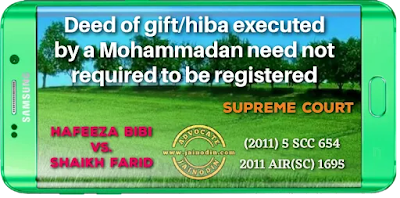The position is well settled, which has been stated and restated time and again, that the three essentials of a gift under Mohammadan Law are; (i) declaration of the gift by the donor; (2) acceptance of the gift by the donee and (3) delivery of possession. Though, the rules of Mohammadan Law do not make writing essential to the validity of a gift; an oral gift fulfilling all the three essentials make the gift complete and irrevocable. However, the donor may record the transaction of gift in writing. Asaf A. A. Fyzee in Outlines of Muhammadan Law, Fifth Edition (edited and revised by Tahir Mahmood) at page 182 states in this regard that writing may be of two kinds : (i) it may merely recite the fact of a prior gift; such a writing need not be registered. On the other hand, (ii) it may itself be the instrument of gift;such a writing in certain circumstances requires registration. He further says that if there is a declaration, acceptance and delivery of possession coupled with the formal instrument of a gift, it must be registered. Conversely, the author says that registration, however, by itself without the other necessary conditions, is not sufficient.[Para No.27]
Mulla, Principles of Mahomedan Law (19th Edition), Page 120, states the legal position in the following words :
"Under the Mahomedan law the three essential requisites to make a gift valid : (1) declaration of the gift by the donor: (2) acceptance of the gift by the donee expressly or impliedly and (3) delivery of possession to and taking possession thereof by the donee actually or constructively.No written document is required in such a case. Section 129 Transfer of Property Act, excludes the rule of Mahomedan law from the purview of Section 123 which mandates that the gift of immovable property must be effected by a registered instrument as stated therein. But it cannot be taken as a sine qua non in all cases that whenever there is a writing about a Mahomedan gift of immovable property there must be registration thereof. Whether the writing requires registration or not depends on the facts and circumstances of each case."[Para No.28]



